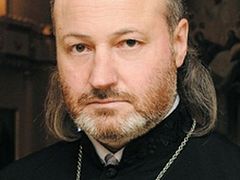Youth was considered to be the main drawback of the new priest. “It would have been better to wait for a couple of years than to ordain him now!” the parishioners said. “He should grow up, mature and become more serious! He is still too young! If he doesn’t laugh, he smiles all the time. But our needs are essential.” The wise senior parishioners soothed the most indignant ones by a well-known fact: Youth is the sort of thing that passes quickly. It helped for some time until the following misunderstanding associated with the manifestation of excessive cheerfulness and frivolity. “They sang ‘Axios’, and the parish gets a new priest!”, they grumbled. “Is he a priest if the milk has not dried off his lips yet? He spends hours on his innernet and all sorts of gadgets. He jokes with the young folks, but he is very shy with adults and avoids them. Of course the harvest is great. But can a child cope with a plow? Who asked us?!” The Bishop who had appointed the young priest to this parish was also scolded as well as the father. A frivolous father. Just a big gadget.
Apparently, Christ uses not only people for our correction, but sometimes He also takes up gadgets, as experience shows. Indeed. After a while, the parishioners were surprised to find that the young father had become serious. At first, he was unduly serious and even depressed. The sternest people, who had formerly resented his childishness, were afraid of him: “Did something happen?”
Indeed. God’s humor is subtle. It hits home.
They gave him a hug after one church service. “Father, let’s go talk. You’re not yourself. What’s happened?”
Accustomed to sidelong glances, he even flinched. But when he saw that the people cared about him and wished him well, he softened and melted.
"Okay, let’s go.”
In the refectory he said that he had died. Up and died.
We tensed up. “Really?”
“Exactly.”
He smiled sadly and told us his story:
“On one painful evening, when a strong feeling of hunger after vespers was clearly felt, I went to the grocery store to buy some food. I didn't have any cash, so I began paying by card. But not so fast. ‘Your card is blocked,’ the cashier said. With shame and anger, I left the purchased food at the checkout, and went home to please my young wife with with some old, stashed away canned food. ‘The card is valid for another two years. Why is it blocked?’ I thought. Well, we had a bite to eat at the very least, and I surfed the net to find the online banking site (the elderly people winced at these words) to find out what was wrong. Indeed. The card was blocked completely. ‘What’s the news?’ I called this very bank and said, “Unblock my card! My young wife and I want to eat!’ The operator answered in a harsh voice, ‘The card has been blocked in connection with the death of the owner.’ ‘What?’ I pinched myself and asked my wife to have a look at me. “You’re still all right”, she said. The woman on the phone supposed that there must be some misunderstanding, but according to the data available to her, such-and-such a man (by complete coincidence his name was the same as mine) had died. In a final effort, I asked her to compare our dates of birth and addresses. It was here that the mistake had occurred: It turns out that my namesake had died. He was fifty years older than me and lived in another place. “Well, wait,” she chirped, “The bank will fix the problem tonight.”
“I was lying on my bed that night. Liturgy would be the next day. It would be better to get some sleep but I was unable. I was thinking, ‘The time will come when both the date of birth and the address will coincide. And then what will I say, not to the bank, but to Christ?” I could not help but feel uncharacteristically sad. I was tossing and turning in bed till two in the morning. Then I stood in front of the icons and burst into tears quietly, trying not to wake up my wife. I was crying, thinking and repenting. Needless to say, I came to the church earlier than usual, tried to serve earnestly... I prayed for my namesake and for all the dead.”
“Yes,” the parishioners, nodded, “we have noticed that the Litanies of the Departed have become longer. Don’t be so upset. Seriousness is a good quality, but after all, at the same time we also have to smile.”
“Everything in its season.” I said. “Both tears and a smile.”
Now the most serious parishioners stared at the young priest with genuine respect. One mumbled barely audibly in the doorway:
“So much for the ‘boy’! Boys quickly become fathers. Of course, that is, if they are true fathers.”





